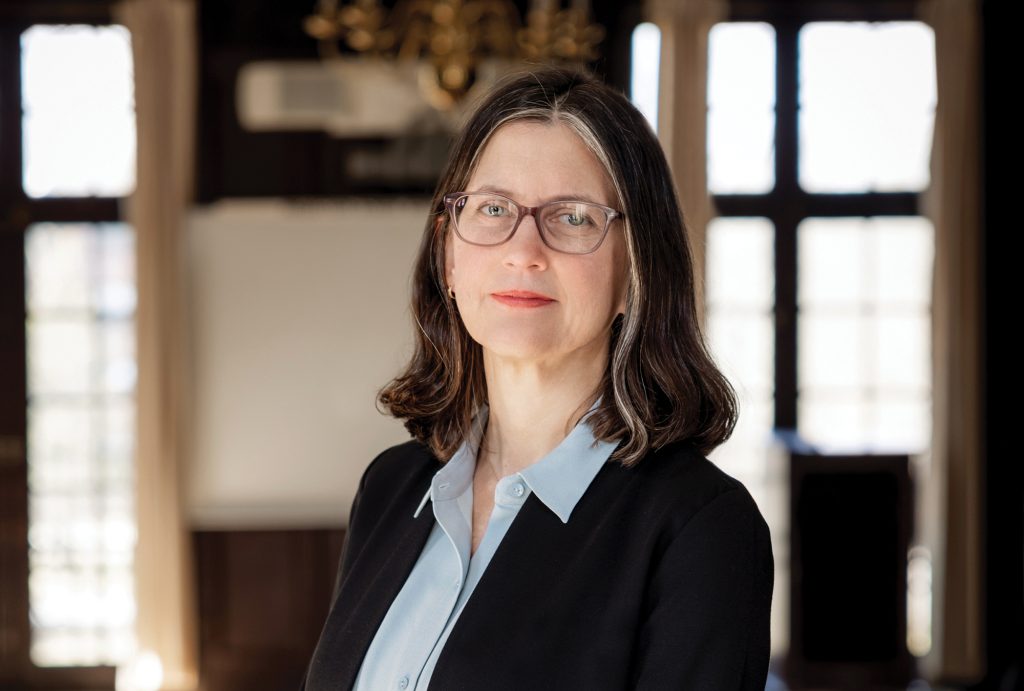Founders Professor of Law Mary Bilder is among the four finalists for the George Washington Prize, an annual award that recognizes the past year’s best works on the nation’s founding era, especially those that have the potential to advance a broad public understanding of early American history.
In a statement, the prize’s founders—George Washington’s Mount Vernon, the Gilder Lehrman Institute of American History, and Washington College—noted that the $50,000 George Washington Prize “is one of the nation’s largest and most notable literary awards.”
An eminent legal historian, Bilder is being recognized for her most recent work, Female Genius: Eliza Harriot and George Washington at the Dawn of the Constitution (University of Virginia Press, 2022). It is based on the life and constitutional influence of Elizabeth Harriot Barons O’Connor, a female lecturer and educator in Philadelphia in the summer of 1787. In the book, Bilder argues that the delegates to the Constitutional Convention could have chosen to exclude women, but they did not. One of the reasons why was educator and entrepreneur Eliza Harriot.
The book has garnered outstanding reviews. “Bilder… is a detective extraordinaire. Distinguished by lucid prose and exceptional research, Bilder’s Female Genius resurrects an individual who had been lost to us… Bilder is persuasive in suggesting that Harriot’s presence played a role in shaping the final language of the Constitution.” (William and Mary Quarterly). “A compelling biography of a woman whose life was both extraordinary and representative… Bilder convincingly argues that debates about female intellectual capacity took center stage during the Age of the Constitution precisely because every one, at least implicitly, understood that education could provide the first step toward political representation…” (Journal of the Early American Republic). “[Bilder] is a master of fashioning a strikingly original narrative about a seemingly familiar subject.” (American Journal of Legal History).
Commenting in the news release about the Washington Prize finalists, James Basker, president of the Gilder Lehrman Institute, said that “it is heartening to see such fine writing about the Founding Era, on a wonderfully expansive range of topics. These books all make important contributions, and above all, each of them is beautifully written. Readers are in for a treat with all four of these finalists for the Washington Prize!”
“Each of these four books sheds new light on an extraordinary American from the Revolutionary era,” added Adam Goodheart, director of Washington College’s Starr Center for the Study of the American Experience. “Three of these figures became famous names, while the fourth has been largely—and undeservedly—forgotten. Together, the nominees prove that the saga of our country’s founding still has the potential to surprise and enlighten us.”
Bilder commented, “I am so very honored by Female Genius being named a finalist for this remarkable prize. Like other individuals of the framing generation, Eliza Harriot’s ambition and work for constitutional inclusion was largely forgotten. I am grateful to the Washington Prize committee for recognizing her story among the finalists.”
As has happened every year since the Washington Prize was created in 2005, an independent jury evaluated between 50 and 100 books published in the past year that explore the history of the American Founding era. The four books named finalists for the prize are outstanding examples of how rich and robust this field of study has become.
Patrick Spero, executive director of the George Washington Presidential Library at Mount Vernon, said, “For the first time, the finalists for the Washington Prize are all biographies. It is an enriching group that includes original takes on well-known figures and works that bring individuals who have been overlooked for too long to life. Each book contains important lessons from the past that resonate today; perhaps most important of all is the power of individuals to shape their world.”
The George Washington Prize winner will be announced in New York City on September 21. The other books are Fred Kaplan, His Masterly Pen: A Biography of Jefferson the Writer (New York: Harper, 2022); Stacy Schiff, The Revolutionary: Samuel Adams (New York: Little, Brown, 2022); Maurizio Valsania, First among Men: George Washington and the Myth of American Masculinity (Baltimore: Johns Hopkins University Press, 2022).
Bilder’s scholarship focuses on the early history of the Constitution: the concept of a Framing Generation; Native Nations and the 1787 Constitution; the early constitutional status of women; written constitutionalism as a new genre; James Madison’s Notes of the Convention; the history of judicial review; colonial and founding era constitutionalism, and Robert Morris, the civil rights activist and antislavery lawyer.
Her two other recent books are Madison’s Hand: Revising the Constitutional Convention (Harvard University Press), which was awarded the 2016 Bancroft Prize in American History and Diplomacy and the James C. Bradford Prize for Biography from the Society for Historians of the Early Republic. It was also named a finalist for the George Washington Book Prize. The second, The Transatlantic Constitution: Colonial Legal Culture and the Empire (Harvard University Press), received the Littleton-Griswold Award from the American Historical Association.
Video: Meet the Authors: 2023’s Best Books on the Founding Era
Mount Vernon event: Hear from the four finalists for the 2023 George Washington Prize, Mary Sarah Bilder, Fred Kaplan, Stacy Schiff and Maurizio Valsania, as they discuss their important new books on the founding era.


